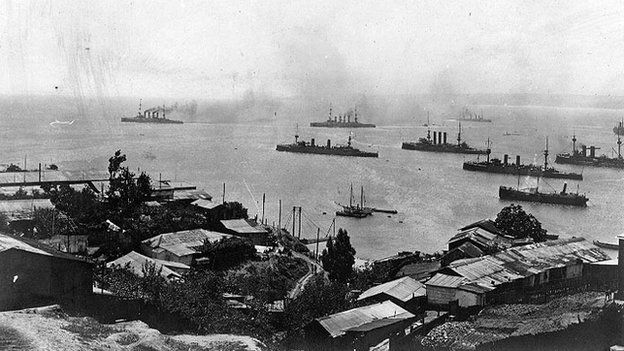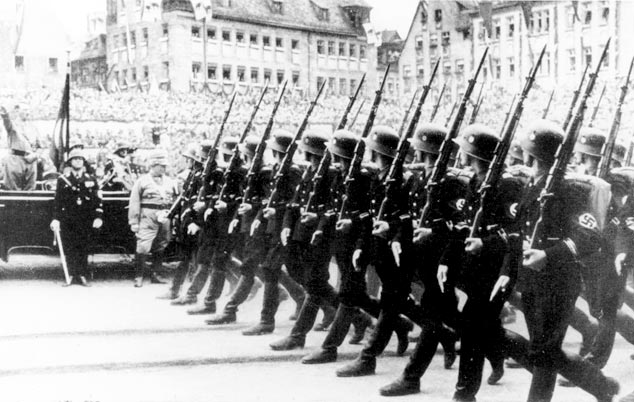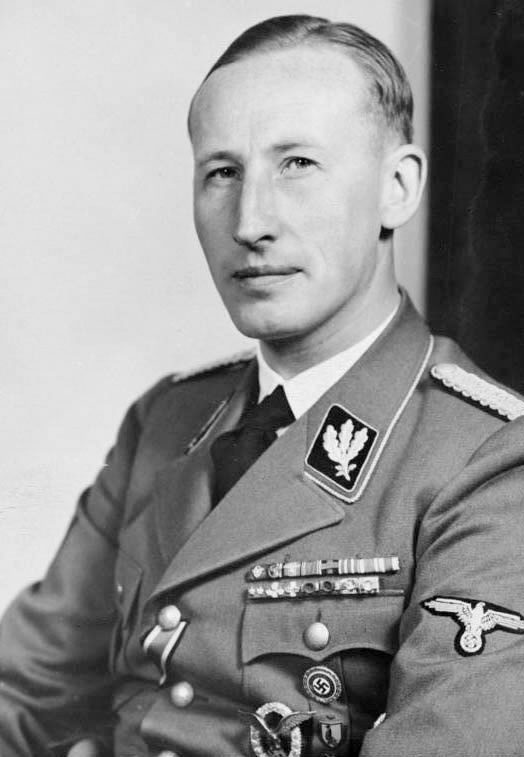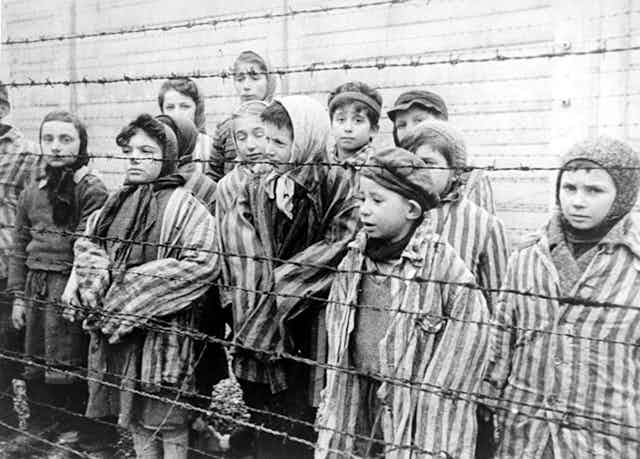
If Hitler was the most powerful man in the Third Reich, the second most feared was the man in black, a small, unassuming, bespectacled ex-chicken farmer who would go on to become one of the greatest mass murderers in history, who would set up one terror organisation and work his way into controlling the other, and who would, in the end, meet the fate of most if not all of Hitler’s inner circle. But who was Heinrich Himmler, and how did he rise so quickly within the Nazi echelons of power to become the living symbol of the oppression of the Third Reich, synonymous with torture, anti-semitism and murder?
(For much of this entry I will be referring to
Heinrich Himmler: The Sinister Life of the Head of the SS and Gestapo by Roger Manvell and Heinrich Fraenkel)
I: Born to Darkness: Heil to the Prince
The turn of the century brought forth a monster whom history would curse, and who would in three short decades write his name large in blood and darkness across the pages of the Second World War. Heinrich Himmler was born on October 7 1900, the second of three boys, and given the name of the Bavarian Prince for whom his father, Gebrardt, a Munich schoolteacher, had been appointed as private tutor. Himmler did not come from a wealthy or noble family, unlike his contemporary Goring, though his father, conscious of his great fortune and status as His Highness’s tutor, did what he could to act like a noble, buying expensive art and furniture for the flat in which he lived with his wife, Anna. His own father had been a penniless soldier, and Gebrardt was determined his sons would have a better start in life than he himself had. His sons of course when they were old enough attended his own school, but there is no evidence that he treated them any differently. He may, in fact, have been harder on them, as discipline and manliness were important to him, no more so in his own sons.
As the First World War began, Himmler was of course too young to enlist, being only fourteen when war broke out, so unlike his later beloved leader he could only read about it and occasionally witness things like prisoners being transferred through his hometown of Landshut. Even at this early age his contempt for what he would no doubt have termed “lower races”, and his burgeoning anti-semitism, as well as his nationalist fervour, were evident. He wrote of Russian prisoners that
"They multiply like vermin. As for the Landshuters, they are as stupid and chickenhearted as ever. Whenever there is talk about our troops retreating, they wet themselves.”

He was eventually drafted in 1917, and does seem to have seen some action, though like Hitler he would embellish his actions, claiming he led men into battle when it is clear he was not an officer and could do no such thing, and the idea comes across that he joined up, or was able to join up, too late: the war ended less than a year later, and by the time he enlisted in December 1917 the tide was beginning to turn against Germany, leading to their ultimate defeat and surrender in November of the next year. I suppose to be fair to him (much as I don’t wish to be) the appellation that has followed him down through history - and which I’ve used myself here in the introduction - of being a failed chicken farmer isn’t quite accurate. In fact, he did work on a farm for about a month, but he got very sick - he was never a well child - and the cause was traced to the farm, from which he was told to abstain for a year at least. There’s no mention either in the book or in the Wiki article as to specifically what he farmed, so while it may have been chickens, it may just as well have been sheep or pigs, or crops. At any rate, his farming career was short and ill-starred, and he entered the University of Munich in 1919, where he studied agriculture.
Though he claims to have fallen in love with the daughter of the woman who ran the eatery where he took his meals, the relationship between Maja Loritz and him seems to have been platonic, more, as he says himself, as if she were his sister. Nothing came of it, and he began to think about another war which he believed was on the horizon.
‘I think we are heading for serious times. I look forward to wearing uniform again.’ His best friend - perhaps his only friend - Ludwig Zahler, he seems to have dropped quite quickly, though in contrast to Hitler he seemed prepared to spend time in Russia if necessary, and even learned the language. Hard to imagine Der Fuhrer polluting his pure German (!) tongue with the bastardised language of the hated Bosheviks!
Throughout his early adulthood, Himmler gives the impression almost of a man masquerading as a human, some sort of cold alien being who does what he has to in order to fit in, not to stand out. He dated girls but made no bones of the fact that he was not interested in sex with them, he had friends but was close to none of them, and he did all he could to be socially acceptable, while still remaining aloof and detached from his fellow humans. He comes across as a man who realises he is missing something in his life, who is not satisfied with himself, as this self-effacing comment demonstrates:
‘I still lack to a considerable degree that naturally superior kind of manner that I would dearly like to possess.’ He had also given up his ideas of heading east to farm in Russia, and was now considering Turkey instead.
His views on women are not too surprising, considering the kind of man we know he grew up into, but still disturbing when he admits to his friend that he does indeed despise them. He goes further:
‘A real man will love a woman in three ways: first, as a dear child who must be admonished, perhaps even punished, when she is foolish, though she must also be protected and looked after because she is so weak; secondly, he will love her as his wife and loyal comrade, who helps him fight in the struggle of life, always at his side but never dampening his spirit. Thirdly, he will love her as the wife whose feet he longs to kiss and who gives him the strength never to falter even in the worst strife, the strength she gives him thanks to her childlike purity.’
One concept that resonates very strongly here, and in most of his writings, is the idea of purity, and he seemed to prize that almost above all else. This would, of course, make him a perfect fit for the Nazi Party when they took power. Similar to Hitler, but not Goring, he subsisted on a very small allowance; his father was not rich, and not given to supporting his sons more than he had to. Perhaps he believed they should carve their own way in the world. His budgeting and his attention to detail marked him as a careful, meticulous man, perhaps what we might call today a bean counter, and this of course would serve him well when he took over perhaps the most frighteningly administrative organisation of the twentieth century, where people were reduced to numbers and filed away.

His intention was to remain celibate until he married, if he ever did, and this refusal to join in and let himself go made it hard, even impossible, for him to make friends, and also marked him out as a little weird. He would never really fit in, and it’s hard, even at this early stage, not to see this almost rejection of him by the world as fuelling the inhuman and despicable acts he would oversee during his tenure as Germany’s most feared man. Around about now he also began to have doubts about religion. A staunch Catholic, he vowed to remain faithful even if he was excommunicated - why he feared such a fate should befall him is unknown - but went to mass less and less from about 1924 onwards.
II: Darkness Calling: The Circle of Evil is Forged

His first real brush with anything approaching the Nazi Party came on January 26 1922, when he met Captain Ernst Rohm at a rifle club meeting. Rohm would go on to become head of the SA, and be perceived as enough of a threat by Hitler to be one of those murdered during the “Night of the Long Knives”, but Himmler was star-struck by the older man, who held the same views he did about Bolshevism. By the middle of the year the phrase “the Jewish question” had begun appearing in his well-kept but seemingly ultimately boring and pedantic diaries. It should be, in fairness, understood that Himmler’s views - and those of Rohm - were not unique in Germany at that time, nor even unusual. Hatred of Jews had, as we have already established, been well entrenched even before the myth of the “stab-in-the-back theory”, as everyone needs someone or something to blame their woes on, and the People of Abraham have been convenient scapegoats all through history. In fact, around this period it would probably be seen as odd if you didn’t hate the Jews. Not that that in any way makes it right, no more than being racist about blacks, Irish, Chinese, West Indian or any other race during the 1970s or 1980s was right. But it was, at the time, the way of the world. Look, even Churchill had his problems with the Jewish race, as we’ve seen.
Then again, of course, hating or professing to hate Jews is a far different thing to actively attacking them, and our man Himmler was naturally about to gravitate towards the latter. In the company of the man he saw as a war hero, and indeed a mentor (until Hitler came along) Heinrich Himmler joined the Nazi Party, four months before Hitler’s famous failure at the Munich
Bürgerbräukeller, a failed coup that landed the future leader of the Reich in jail. But first Himmler joined Rohm’s brigade, the
Reichskriegsflagge, the deceptively-innocent-sounding national war flag society, and indeed this is what he did: waved a flag. When Rohm and his brigade were detailed by Ludendorff and Hitler to take the war ministry, which they did, fulfilling their part of the
putsch, Himmler stood outside waving the Imperial German flag. Perhaps due to this minimal participation in the event, he escaped prison while Rohm, along with Ludendorff and Hitler, were held awaiting trial the following February. In the end, only the two latter would be imprisoned.

Well, as everyone knows, imprisoned isn’t really the word in terms of Hitler. One thinks of the more recent so-called incarceration of Pablo Escobar; a cushy, comfortable, all-mod-cons “prison” which allowed visitors, alcohol, parties (though I doubt Der Fuhrer threw many of those) and access to writing materials, with which he penned the worldwide best-seller (!)
Mein Kampf. But Rohm was released without charge, and so free to pursue his goal of setting up his own paramilitary force, which he expected to become the armed wing of the new Nazi Party, the SA. Hitler, of course, would have other ideas once he got out. For now though, Himmler joined the same right-wing, anti-Semitic party that Rohm did, the
Völkische, and set about campaigning for them. To the chagrin of his family, having lost his job due to his participation in the putsch, Heinrich refused to seek another job, but instead devoted himself to politics in the name of the
Völkische.
Meanwhile Rohm had resigned in disgust at the now-released Hitler’s determination to pursue more legal paths to power, and had taken a job in Bolivia. He would return to lead the SA at Hitler’s request in 1930, but his dictatorial style of leadership was not approved by Hitler, who feared Rohm would become too powerful and with the SA behind him as an autonomous body answerable to him (and, ostensibly, Hitler) might mount his own bid for power and topple Hitler. Four years later he would be dead, as Hitler “cleaned house” in a purge which became known as
Nacht der langen messer, or Night of the Long Knives.
For now, Himmler was a student without a tutor, and with the previously-all-but-dead Nazi Party beginning a resurgence in power and popularity in 1925, he rejoined the organisation almost exactly two years after he had originally signed up. Now he would have a darker, more savage, more powerful mentor, and I don’t mean Hitler. Although he ended up working as a secretary and general dogsbody for the Strasser brothers, Otto and Gregor, who were instrumental in the rebirth of the Nazi Party, Himmler soon realised these two moderates did not share his virulent anti-Semitic views. When their secretary (and occasional spy, as he kept an eye on the cache of arms the Nazis were secretly amassing as they prepared for war) wrote to a Nazi party member, a supporter of Hitler who was leaving for America, of his plan to name-and-shame local Jews, they laughed at him.
 ‘For some time I have entertained the project of publishing the names of all Jews, as well as of all Christian friends of the Jews, residing in Lower Bavaria. However, before I take such a step I should like to have your opinion, and find out whether you consider such an undertaking rich in prospects and practicable. I would be very indebted to you if as soon as possible you would give me your view, which for me is authoritative, thanks to your great experience in the Jewish question and your knowledge of the anti-Semitic fight in the whole world.”
‘For some time I have entertained the project of publishing the names of all Jews, as well as of all Christian friends of the Jews, residing in Lower Bavaria. However, before I take such a step I should like to have your opinion, and find out whether you consider such an undertaking rich in prospects and practicable. I would be very indebted to you if as soon as possible you would give me your view, which for me is authoritative, thanks to your great experience in the Jewish question and your knowledge of the anti-Semitic fight in the whole world.”
While his bosses may have twirled their index fingers at their temples and grinned at the nationalist and racist fervour of this young upstart, the letter does show how Himmler already intended to operate, if he got a chance. There would be no compromise, no finding common ground with Jews (including any in positions of power), no attempt to come to terms or understand each other’s position, and no backing down. To him, all Jews were scum (and indeed, as the letter shows plainly, he viewed their supporters - “Christian friends of the Jews”) - in the same dark light of hatred, and all were to be dealt with in the same manner. It was this kind of attitude that would endear him (if that’s not the wrong word to use) to another up and coming star of the Nazi party, a man who would in fact control its destiny through the manipulation and dissemination of propaganda designed to support it.
Himmler met Josef Goebbels in 1925, when the young doctor came to work for the Strassers. Goebbels was already known to Hitler, and would soon gratefully accept the position of organiser for the Nazi party, but Hitler knew nothing about his contemporary. While Goebbels showed a flair for writing, rhetoric, public speaking and an ability to twist the truth into whatever shape he wished his listeners to perceive, Himmler was little more than an office boy who dreamed of one day being a soldier. He had no real aptitude beyond that of clerical organisation, administration and bureaucracy, abilities which would stand him in good stead when he became the leader of the SS, and later, the Gestapo. Himmler looked as he was: a filing clerk with a heart full of hatred and the organisational brain to apply that to reducing human beings to numbers; manilla files containing names, races, birth dates, colour of eyes, colour of hair; people turned into statistics. His cold, calculated manner would also allow him to sign death or torture warrants of men, women and children with no more emotion than he would evince signing for a pair of new boots.
Both of these men would in time turn out to be indispensable to Hitler’s new Reich, as one told the people what Hitler wanted them to hear, and the other closely monitored what they said, and how they said it. Between them they would become two of the most powerful men in Germany, if not the world. But one would, if you will, have the courage of his convictions and remain true to his leader to the end and follow him to Hell, the other would make a cowardly attempt to escape and save his own life. But that was in the future, and for now both men only knew each other in passing, nodding acquaintances, soon to be united in their worship of the man who would burn the world.
Himmler’s big chance came when he was appointed second in command of a small group called the
schutzstaffel, or SS. Numbering at the time only two hundred, it would come to encompass the entire Nazi organisation, its secret police, the most feared and powerful arm of the party. Originally detailed to act as a bodyguard corps for Hitler, it would in time (as we will see when we go into its formation and deployment in much greater detail later on in this journal) hold sway over the German
wehrmacht, the army, and staff and run the horrific concentration camps, the labour and death factories which the Nazis would set up to eliminate the Jews.
He had joined the SS in 1925, soon after rejoining the Nazi Party, and proudly bore the blood flag they carried, a replica of the one that had fallen during the putsch, and which Hitler would mythologise as having been steeped in the blood of martyrs, though in reality all the SS had done on November 9 was wreck the printing presses of a socialist newspaper. His position in the group, though given the grandiose title of Deputy Reich Propaganda Chief, was mostly to attract new members, enlist willing men and swell the ranks of the SS. Around this time he seems to have begun to impress Goebbels, and the two spent more time together than they had previously when he had worked on and off in the offices of the Strassers.



















 Linear Mode
Linear Mode
